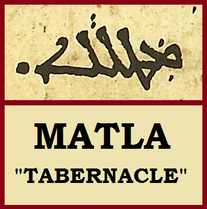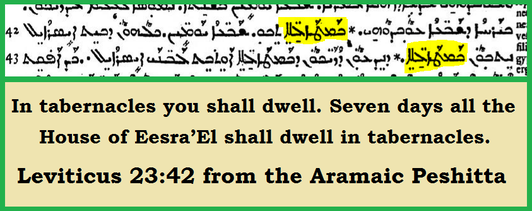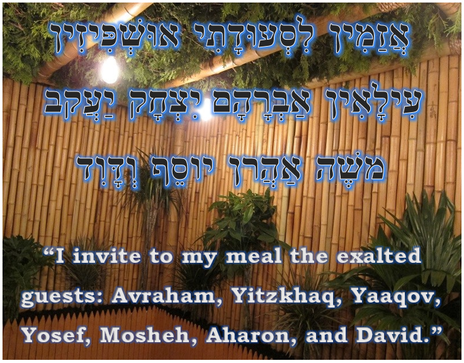THE CENTURION'S SUKKAH
by Jeremy Chance Springfield
1/19/18
The Messiah performed many miracles during His ministry. Most of those miracles involved healing a person in need of wholeness. In fact, the New Covenant writings record over twenty-five incidents of Yeshua healing people He encountered during His first coming. His compassion to His brothers in Israel was expressed with repeated incidents of restoration.
One of the most unusual accounts of healing could be said to be that of the Roman centurion’s servant, recorded for us first in Matthew 8:5-13. This incident stands out for two reasons in particular: (1) it was not typical for Messiah to deal with people outside the Jewish people, and (2) the very nature of the story that displays the unheard-of level of trust of the centurion himself is similarly unique. The account shows the power of faith and humility quite well, and the eagerness of Messiah to be compassionate on those who display both.
The nature of the story takes on an even greater depth when it is approached from the Aramaic text of the Peshitta New Testament. Before we look at what that has to tell us, however, the text as it is translated from the Greek into English of the popular KJV is here first shared to display how it is typically presented.
One of the most unusual accounts of healing could be said to be that of the Roman centurion’s servant, recorded for us first in Matthew 8:5-13. This incident stands out for two reasons in particular: (1) it was not typical for Messiah to deal with people outside the Jewish people, and (2) the very nature of the story that displays the unheard-of level of trust of the centurion himself is similarly unique. The account shows the power of faith and humility quite well, and the eagerness of Messiah to be compassionate on those who display both.
The nature of the story takes on an even greater depth when it is approached from the Aramaic text of the Peshitta New Testament. Before we look at what that has to tell us, however, the text as it is translated from the Greek into English of the popular KJV is here first shared to display how it is typically presented.
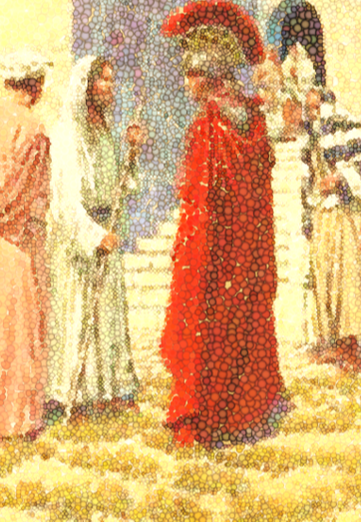
5 And when Jesus was entered into Capernaum, there came unto him a centurion, beseeching him,
6 And saying, Lord, my servant lieth at home sick of the palsy, grievously tormented.
7 And Jesus saith unto him, I will come and heal him.
8 The centurion answered and said, Lord, I am not worthy that thou shouldest come under my roof: but speak the word only, and my servant shall be healed.
9 For I am a man under authority, having soldiers under me: and I say to this man, Go, and he goeth; and to another, Come, and he cometh; and to my servant, Do this, and he doeth it.
10 When Jesus heard it, he marvelled, and said to them that followed, Verily I say unto you, I have not found so great faith, no, not in Israel.
11 And I say unto you, That many shall come from the east and west, and shall sit down with Abraham, and Isaac, and Jacob, in the kingdom of heaven.
12 But the children of the kingdom shall be cast out into outer darkness: there shall be weeping and gnashing of teeth.
13 And Jesus said unto the centurion, Go thy way; and as thou hast believed, so be it done unto thee. And his servant was healed in the selfsame hour.
6 And saying, Lord, my servant lieth at home sick of the palsy, grievously tormented.
7 And Jesus saith unto him, I will come and heal him.
8 The centurion answered and said, Lord, I am not worthy that thou shouldest come under my roof: but speak the word only, and my servant shall be healed.
9 For I am a man under authority, having soldiers under me: and I say to this man, Go, and he goeth; and to another, Come, and he cometh; and to my servant, Do this, and he doeth it.
10 When Jesus heard it, he marvelled, and said to them that followed, Verily I say unto you, I have not found so great faith, no, not in Israel.
11 And I say unto you, That many shall come from the east and west, and shall sit down with Abraham, and Isaac, and Jacob, in the kingdom of heaven.
12 But the children of the kingdom shall be cast out into outer darkness: there shall be weeping and gnashing of teeth.
13 And Jesus said unto the centurion, Go thy way; and as thou hast believed, so be it done unto thee. And his servant was healed in the selfsame hour.
This event from the Greek text shows the trust and the humility of the centurion quite well, but the Aramaic text includes a detail that changes everything about this already amazing account, and raises the bar on the concepts of faith and humility displayed here, as well as the significance of the Messiah’s response, in a truly beautiful way. Read carefully now the same passage of Matthew 8:5-13 as it is found in the ancient Peshitta.
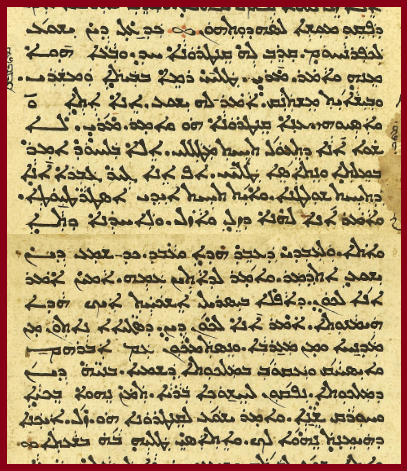
5 And when Yeshua entered unto K’far-Nakhum, a centurion drew near to Him, and was inquiring from Him,
6 and said, “My master! A boy-servant is placed in my home, and is paralyzed, and evilly oppressed!”
7 And Yeshua said to him, “I shall come and shall heal him!”
8 The centurion replied, and he said, “My master, I am not worthy that you should enter under my tabernacle, but instead, only speak with the word, and my boy-servant shall be healed,
9 for even I am a man who is under authority, and there is under my hand soldiers, and I say to this [one], ‘Do go,’ and he goes, and to another, ‘Do come,’ and he comes, and to my servant, ‘Do this,’ and he does it.”
10 But when Yeshua heard, He marveled, and said to those with Him, “Ameeyn! I say to you that not even in Eesra’El have I found trust as this!
11 Yet, I say to you, that many shall come from the East, and from the West, and they shall recline with Awraham, and Eeskhaq, and Yaqub in the Kingdom of the Heavens.
12 But the sons of the Kingdom shall be cast to outer darkness; there shall be weeping and grinding of teeth.”
13 And Yeshua said to the centurion, “Do go. According to your trust, it shall be to you.” And his boy-servant was healed in that hour!
6 and said, “My master! A boy-servant is placed in my home, and is paralyzed, and evilly oppressed!”
7 And Yeshua said to him, “I shall come and shall heal him!”
8 The centurion replied, and he said, “My master, I am not worthy that you should enter under my tabernacle, but instead, only speak with the word, and my boy-servant shall be healed,
9 for even I am a man who is under authority, and there is under my hand soldiers, and I say to this [one], ‘Do go,’ and he goes, and to another, ‘Do come,’ and he comes, and to my servant, ‘Do this,’ and he does it.”
10 But when Yeshua heard, He marveled, and said to those with Him, “Ameeyn! I say to you that not even in Eesra’El have I found trust as this!
11 Yet, I say to you, that many shall come from the East, and from the West, and they shall recline with Awraham, and Eeskhaq, and Yaqub in the Kingdom of the Heavens.
12 But the sons of the Kingdom shall be cast to outer darkness; there shall be weeping and grinding of teeth.”
13 And Yeshua said to the centurion, “Do go. According to your trust, it shall be to you.” And his boy-servant was healed in that hour!
Aside from slight differences in wording, the account from the Aramaic is essentially identical to the Greek text. The only difference of true weight lay in the Peshitta’s use of “tabernacle” as opposed to the Greek’s use of “roof.” Herein lay the key to properly understanding the true value of this account.
The word that is translated as “my tabernacle” in the Aramaic Peshitta is MATLEY, or MATLA without the possessive. In Jewish Aramaic, this is its key meaning. Only in Egyptian-Aramaic and in Eastern Syriac does the term also have the secondary meaning of “roof,” like the Greek choice of wording. In fact, knowing that it has a dual meaning shows how the Greek term was arrived-at by later translators. However, since we know that Matthew recorded faithfully the accounts of Messiah in the Jewish Aramaic tongue that was being spoken in Israel at the time, it can only very specifically refer in this case to a temporary and crude shelter of some type: tabernacle, booth, hut.
The word that is translated as “my tabernacle” in the Aramaic Peshitta is MATLEY, or MATLA without the possessive. In Jewish Aramaic, this is its key meaning. Only in Egyptian-Aramaic and in Eastern Syriac does the term also have the secondary meaning of “roof,” like the Greek choice of wording. In fact, knowing that it has a dual meaning shows how the Greek term was arrived-at by later translators. However, since we know that Matthew recorded faithfully the accounts of Messiah in the Jewish Aramaic tongue that was being spoken in Israel at the time, it can only very specifically refer in this case to a temporary and crude shelter of some type: tabernacle, booth, hut.
More importantly, when we return to its usage in the Aramaic translation of the Hebrew Torah, we find it appears in a very particular passage: in the book of Leviticus 23:42, we see the same word used when the Holy Spirit commands us to observe the festival of Sukkot for seven days, where we dwell in a SUKKAH for the duration of the holy time – a crudely-fashioned temporary dwelling, commonly translated as “tabernacle / booth / hut” - a place of devout celebration.
This Jewish usage of the term to refer explicitly to a SUKKAH is also seen in scattered passages in the Aramaic Targums, and in the Talmud Yerushalmi, further showing how the term was used in Israel to refer to the religious observance of Sukkot.
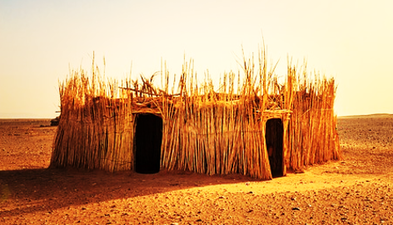
Properly understanding this shows us an important detail to the story that is missed if we only read the Greek manuscripts. The Greek texts, with its reading of “roof,” have the centurion telling Yeshua that he is unworthy for the Jewish rabbi to enter his home. Such a statement is not really that surprising. He, being considered a Gentile, would be viewed as unclean according to Torah, and so an observant Jewish person would not think to enter onto the premises of such a person.
The Aramaic creates a completely different dynamic: the centurion is telling Yeshua that, although he himself is a Gentile by birth, he has taken it upon himself to observe Torah, to the point of participating in the yearly festival of Sukkot, wherein the observant builds a SUKKAH / MATLA to dwell in for seven days!
While it may seem odd for a Roman centurion to build a SUKKAH / MATLA that only Hebrews would otherwise be doing, it is important to know that this understanding of the centurion’s careful observance of Torah is substantiated in the parallel account found in Luke 7:4-5. In that part of the account, we see that the centurion was well-known among the Jewish community of Capernaum to be on a level of Torah observance that was not just for show. His faith was legitimate, and validated by the assertion of Yeshua’s fellow Jewish countrymen.
The Aramaic creates a completely different dynamic: the centurion is telling Yeshua that, although he himself is a Gentile by birth, he has taken it upon himself to observe Torah, to the point of participating in the yearly festival of Sukkot, wherein the observant builds a SUKKAH / MATLA to dwell in for seven days!
While it may seem odd for a Roman centurion to build a SUKKAH / MATLA that only Hebrews would otherwise be doing, it is important to know that this understanding of the centurion’s careful observance of Torah is substantiated in the parallel account found in Luke 7:4-5. In that part of the account, we see that the centurion was well-known among the Jewish community of Capernaum to be on a level of Torah observance that was not just for show. His faith was legitimate, and validated by the assertion of Yeshua’s fellow Jewish countrymen.
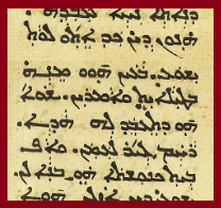
4 Yet, when they came unto Yeshua, they were inquiring from Him earnestly, and they were saying, “He is worthy that you should perform this for him,
5 for he loves our people, and even a House of Congregation he built for us!”
4 Yet, when they came unto Yeshua, they were inquiring from Him earnestly, and they were saying, “He is worthy that you should perform this for him,
5 for he loves our people, and even a House of Congregation he built for us!”
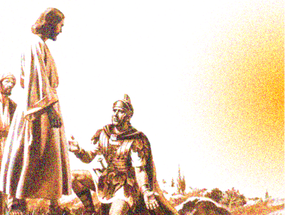
He was not an individual whose observance was in word only. It was not lip service, but shown true based on extensive action from his part. He was not a convert, but likely at the level of what was known as a God-fearer among the Jewish religious community. The seriousness of his observance was displayed in the fact that the Jewish people say of him that he built a synagogue for them in which to worship! The centurion, clearly, truly believed and worshiped the Deity of the Hebrews.
This revelation from the Aramaic changes the nature of the story, for it takes the concept of humility and deepens it to another level: although he was a devout Gentile, observing Torah to the extent that he would personally fund the building of a meeting place for the community, and would even observe the week-long festival of Sukkot every year with the building of his own personal SUKKAH / MATLA tabernacle, he yet does not view himself in any light of grandeur. Rather, his humility is exemplified in the statement he made that he was not worthy for Yeshua to even enter his SUKKAH/ MATLA!
Such a statement is profound, for one of the most important factors of having a SUKKAH is the inviting of USHPIZIN (Aramaic for “guests”) to come and fill it with you as you celebrate the goodness and favor of the Holy One. Of special honor it would be indeed for a rabbi to pay a visit to one’s SUKKAH as an USHPIZA “guest.” The humility of the centurion is displayed in saying that he is not deserving of even the honor of the Jewish rabbi at a time and place where one would expect to find a rabbi bestowing such honor! Although he was observant, and had facilitated the building of a synagogue, the Gentile centurion did not stand upon those credentials, but bowed in humility in order that his servant might be healed.
Instead, what he did know was the legitimate nature of spiritual authority he had seen in his days of worshiping the Deity of the Hebrews. He knew the reality of it, and knew that if Yeshua was truly the healer everyone believed Him to be, the spiritual authority He carried would not need Him to even come to his home. Yeshua need but say the word, and the reality would manifest in the healing of the centurion’s servant.
This astounding level of trust has never been experienced by Yeshua in all His ministries in Israel. Yet, it was absolutely true. The centurion, although a Gentile, knew as fact the flow of authority he had learned in his own culture and career, and knew that if it was such among the ranks of human authority, how much more so would it be in the spiritual. His display of faith in the spiritual authority of Yeshua should not be missed.
The response of Yeshua to this is equally important. Once the true nature of the centurion’s declaration is understood from the Aramaic text, it enlightens further the statement of Yeshua in response to his faith. Note again a detail in Matthew 8:11 of what Yeshua said about the level of faith of the centurion:
This revelation from the Aramaic changes the nature of the story, for it takes the concept of humility and deepens it to another level: although he was a devout Gentile, observing Torah to the extent that he would personally fund the building of a meeting place for the community, and would even observe the week-long festival of Sukkot every year with the building of his own personal SUKKAH / MATLA tabernacle, he yet does not view himself in any light of grandeur. Rather, his humility is exemplified in the statement he made that he was not worthy for Yeshua to even enter his SUKKAH/ MATLA!
Such a statement is profound, for one of the most important factors of having a SUKKAH is the inviting of USHPIZIN (Aramaic for “guests”) to come and fill it with you as you celebrate the goodness and favor of the Holy One. Of special honor it would be indeed for a rabbi to pay a visit to one’s SUKKAH as an USHPIZA “guest.” The humility of the centurion is displayed in saying that he is not deserving of even the honor of the Jewish rabbi at a time and place where one would expect to find a rabbi bestowing such honor! Although he was observant, and had facilitated the building of a synagogue, the Gentile centurion did not stand upon those credentials, but bowed in humility in order that his servant might be healed.
Instead, what he did know was the legitimate nature of spiritual authority he had seen in his days of worshiping the Deity of the Hebrews. He knew the reality of it, and knew that if Yeshua was truly the healer everyone believed Him to be, the spiritual authority He carried would not need Him to even come to his home. Yeshua need but say the word, and the reality would manifest in the healing of the centurion’s servant.
This astounding level of trust has never been experienced by Yeshua in all His ministries in Israel. Yet, it was absolutely true. The centurion, although a Gentile, knew as fact the flow of authority he had learned in his own culture and career, and knew that if it was such among the ranks of human authority, how much more so would it be in the spiritual. His display of faith in the spiritual authority of Yeshua should not be missed.
The response of Yeshua to this is equally important. Once the true nature of the centurion’s declaration is understood from the Aramaic text, it enlightens further the statement of Yeshua in response to his faith. Note again a detail in Matthew 8:11 of what Yeshua said about the level of faith of the centurion:
11 Yet, I say to you, that many shall come from the East, and from the West, and they shall recline with Awraham, and Eeskhaq, and Yaqub in the Kingdom of the Heavens.
Why would He bring this up in the topic? What does people coming from the East and West and reclining with Abraham, Isaac, and Jacob in the Kingdom have to do with what the centurion displayed by his words of faith?
The answer: everything.
First, the prophet Zechariah tells us that this very thing will happen to the Gentiles in the future, after Yeshua has returned to this world and set up His Kingdom upon the earth. We read of it in Zechariah 14:16, in which we begin to see the connection to the words of Yeshua.
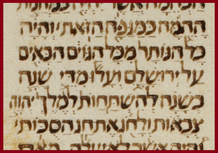
And it shall be [that] all the remnant from all the Gentiles [that] came upon Yerushalaim, that they shall ascend from year upon year, to [give] worship to King YHWH of Armies, and to feast [at] the feast of Tabernacles.
The Gentiles will be expected to come to the land of Israel and observe the festival of Sukkot, just as this Gentile centurion in the Gospels is shown doing already! It will be incumbent upon people from the nations to make the trip and show their allegiance to the Holy One of Israel by observing the festival and building their own SUKKAH / MATLA in the city of Jerusalem!
The detail that Yeshua makes concerning the Gentiles reclining with Abraham, Isaac, and Jacob is also entirely connected to the statement of the centurion about his SUKKAH / MATLA. As it was mentioned earlier in the study, the inviting of USHPIZIN “guests” to the SUKKAH is a big part of the celebratory nature of Sukkot. Everyone wants their observance of building a SUKKAH to be validated with the presence of guests who will rejoice with them in it. A special prayer is even uttered every day in the SUKKAH that speaks to this desire for a celebratory meal in the tabernacle with such guests. The special prayer is not just for any guests, however, but for a very unique group of individuals, who, if they were to show up, would exemplify that the observer’s observance of building the SUKKAH truly was viewed by the Holy One as a worthy endeavor, and merited a special kind of guest. The prayer that is spoken each day for the special guests to come is this:
The detail that Yeshua makes concerning the Gentiles reclining with Abraham, Isaac, and Jacob is also entirely connected to the statement of the centurion about his SUKKAH / MATLA. As it was mentioned earlier in the study, the inviting of USHPIZIN “guests” to the SUKKAH is a big part of the celebratory nature of Sukkot. Everyone wants their observance of building a SUKKAH to be validated with the presence of guests who will rejoice with them in it. A special prayer is even uttered every day in the SUKKAH that speaks to this desire for a celebratory meal in the tabernacle with such guests. The special prayer is not just for any guests, however, but for a very unique group of individuals, who, if they were to show up, would exemplify that the observer’s observance of building the SUKKAH truly was viewed by the Holy One as a worthy endeavor, and merited a special kind of guest. The prayer that is spoken each day for the special guests to come is this:
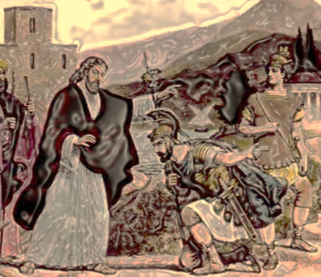
Obviously, if any one of these individuals were to appear as an USHPIZA in your SUKKAH, you would have no doubt that you were worthy in your observance of Torah. The declaration of the Messiah in verse 11 thus shows a clear and undeniable link to the thought of the centurion’s merit in His eyes. Such people as displaying the sincere faith of the centurion would likewise merit the presence of at least the first three of the exalted USHPIZIN of whom petition was made that one’s observance would merit their attendance.
The context of what Yeshua says by mentioning the three patriarchs in connection to the faith of the centurion who felt he was unworthy to have Yeshua in his SUKKAH makes perfect sense. Without understanding the account in its ancient Aramaic text, we lose the depth of humility and the acceptance of faith that is portrayed in the story as it was intended. Once we return to the details preserved in the Aramaic text, appreciating the presence of the centurion’s SUKKAH makes all the difference! Proper faith makes even an unworthy Gentile centurion worthy to sit in a SUKKAH with Abraham, Isaac, and Jacob in the Kingdom that is coming!
The context of what Yeshua says by mentioning the three patriarchs in connection to the faith of the centurion who felt he was unworthy to have Yeshua in his SUKKAH makes perfect sense. Without understanding the account in its ancient Aramaic text, we lose the depth of humility and the acceptance of faith that is portrayed in the story as it was intended. Once we return to the details preserved in the Aramaic text, appreciating the presence of the centurion’s SUKKAH makes all the difference! Proper faith makes even an unworthy Gentile centurion worthy to sit in a SUKKAH with Abraham, Isaac, and Jacob in the Kingdom that is coming!
All study contents Copyright Jeremy Chance Springfield, except for graphics and images, which are Copyright their respective creators.
